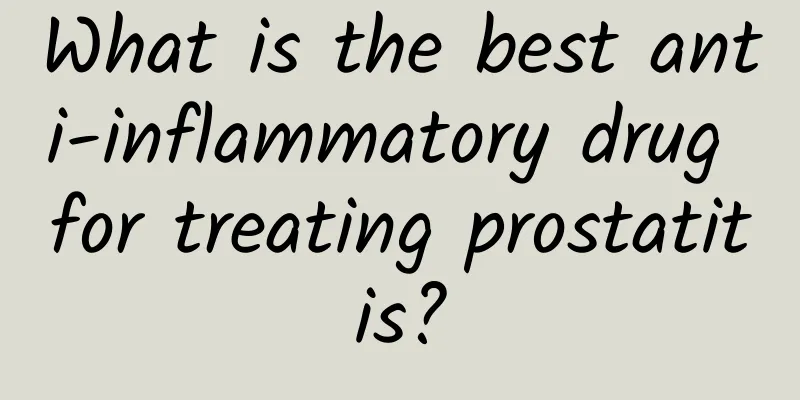What is the best anti-inflammatory drug for treating prostatitis?

|
Everyone must be familiar with prostatitis, a male disease. In today's society, the incidence of this disease is very high, which is related to many bad living habits of men. Many men have the habit of frequent masturbation for a long time. Excessive masturbation can easily lead to prostatitis. In addition, office people who often sit for a long time, people who often smoke, drink, and eat spicy and irritating foods are very likely to develop prostatitis. So for this kind of male inflammation, what kind of anti-inflammatory drugs can patients take to treat it? What anti-inflammatory drug is best for treating prostatitis? 1. What medicine should I take for acute prostatitis? Acute bacterial prostatitis is easy to diagnose and treat, and has a good prognosis. Most patients can recover completely, but a few patients may develop chronic disease. Acute bacterial prostatitis should be treated with fast-acting antibacterial drugs, such as cotrimoxazole and fentanyl, which can quickly control inflammation. The medication should be continued for a period of time to prevent the disease from becoming chronic or recurring. When using antibiotics for prostatitis, you should choose antibiotics that are fat-soluble, easily pass through the prostate barrier, and have a low binding rate to plasma proteins. You can choose first-line drugs such as quinolones (such as norfloxacin, levofloxacin, sparfloxacin, etc.), sulfonamides (such as co-trimoxazole), and tetracyclines (such as tetracycline, meclocycline). 2. What medicine should I take for chronic prostatitis? For chronic bacterial prostatitis, sensitive antibiotics such as cefotaxime and meclocycline can be selected based on bacterial culture and drug sensitivity tests. For chronic non-bacterial prostatitis, if it can be clearly confirmed to be chlamydia and/or mycoplasma infection, erythromycin, meclocycline, basa, etc. can be selected. If there is no chlamydia, mycoplasma or other clear pathogen infection, the antibiotics will not work well after application and should not be used. The medication should be taken for a certain period of time, generally 1 to 4 months, and up to 6 months. Discontinuation of the medication is prone to relapse. After relapse, it is generally recommended to use another course of antibiotics. 3. Precautions for drug treatment of prostatitis It is worth noting that antibiotics are not a panacea for treating bacterial prostatitis. Patients should not abuse antibiotics without restraint, otherwise, not only will the antibiotics lose their effectiveness, but it will also make subsequent treatment difficult. Guidance: Antibiotic treatment is a common method for treating prostatitis. In addition, you can choose Chinese medicine treatment or tea therapy. In normal times, you should overcome bad sexual habits, avoid interrupted sexual life or frequent masturbation, try to reduce the pressure on the perineum, do not wear tight pants, avoid long-term riding, riding a horse or riding movements, quit smoking and drinking, avoid spicy food, reduce the inducement of disease recurrence, drink more boiled water, increase urine output, which is conducive to the discharge of inflammatory secretions, and actively participate in physical exercise to strengthen your physical fitness. |
<<: The top ten taboos for men to pursue girls
Recommend
How to treat men's dampness?
The problem of dampness in men is a particularly ...
What to do if there is a red spot on the glans
The appearance of erythema on the glans is a very...
What are some tips for men to lose weight before going to bed?
Weight loss is a hot topic. It is not only a pate...
How to nourish the kidneys in winter for men
Men have the most serious kidney deficiency in wi...
What is the reason for the itchy glans? I have this disease
Itching of the glans is a common male disease. Ge...
Why do men have lower abdominal pain and blood in their urine?
There are many aspects of our body that can provi...
How to quickly relieve itching caused by allergies? Here are some tips to quickly relieve itching
Among all the symptoms of allergic reactions, itc...
Whether a man has kidney deficiency can be determined by looking at his little finger
Kidney deficiency is a term used in traditional C...
Drink this porridge regularly and you will be thin and beautiful
Barley and red bean porridge is probably familiar...
Men without a partner are not good for their health
A study showed that Married and divorced men lose ...
What are the symptoms of orchitis caused by mumps?
If you have mumps, it is particularly easy to ind...
How to treat white bumps under the glans
Many male friends now report that they have small...
Is ejaculation harmful to the body?
Ejaculation outside the body is quite harmful to ...
What does a man's sperm look like under normal circumstances?
Healthy sperm and healthy eggs combine to form a ...
Male genital papules
What is the reason for red papules on male genita...









